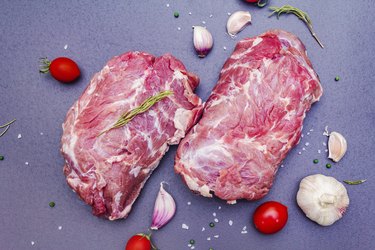
If your stomach hurts after your meals, you might wonder if too much protein is to blame. Generally, a good amount of protein in your diet does not cause digestive trouble all on its own. However, other factors may cause abdominal pain after you consume high-protein meals.
Tip
High-protein meals generally don't cause stomachaches. However, other dietary factors could be the cause of your pain.
Video of the Day
Balance Fiber and Protein
The average healthy adult needs around 0.8 grams of protein per kilogram (0.36 grams per pound) of body weight per day. However, this number can change based on your fitness goals, activity level and age. An online calculator, such as the one that the United States Department of Agriculture maintains, can give you a specific number for the amount of protein you should eat each day.
Video of the Day
While these guidelines can help many people, the jury is still out on whether Americans get too much protein or not enough. More research can help scientists understand how much protein different groups of people need for optimal health.
When you increase your protein intake, you either up your total caloric intake or decrease the number of other macronutrients in your diet. Many people who purposefully increase their protein do so at the expense of carbohydrates, such as with the ketogenic diet.
The Mayo Clinic reports that these high-protein diets often lead people to consume too little fiber. Without enough fiber in your daily diet, you can experience constipation, which may cause abdominal discomfort. You can avoid this problem by choosing high-quality carbs like vegetables and whole grains.
Read more: 4 Signs You May Be Eating Too Much Protein
Examine the Types of Protein
Proteins are the building blocks of life, but some blocks make better foundations than others. If you're consuming high-protein meals and feelings sick afterward, it could be the type of protein rather than the amount that is to blame.
For example, the National Institute of Diabetes and Digestive and Kidney Diseases estimates that about 36 percent of Americans are lactose intolerant, which means that they cannot properly digest one of the sugars found in dairy products. This ailment can develop later in life, so some adults may not know they have it. If you experience digestive discomfort after consuming dairy products, it's possible that the lactose is the culprit rather than the protein.
While general guidelines on protein consumption can help, you are a unique person with specific needs. If your current diet gives you stomach aches, try changing things up under your doctor's supervision to see what helps. You can vary your protein intake by trying different protein sources, such as nuts and seafood; picking low-fat cuts of meat; or using different cooking methods to keep things interesting
Read more: Is Drinking Too Much Whey Protein Dangerous?
Consider Other Possible Culprits
Several dietary factors can cause digestive discomfort, constipation, diarrhea or abdominal pain after meals. For example, simply eating too much food — rather than too much protein — can cause discomfort. Furthermore, as noted by the Centers for Disease Control and Prevention, eating undercooked animal products can cause food poisoning from bacteria such as listeria, Staphylococcus aureus and E. coli. If you experience symptoms of food poisoning, seek medical attention.
Additionally, certain chronic illnesses can also cause digestive problems after meals. People with untreated inflammatory bowel disease often experience gastrointestinal symptoms. If you have chronic or consistent digestive problems, talk to your doctor about possible causes.
Some people have other food sensitivities that may make them sensitive to other types of protein. For example, people with milk allergies may react to lactose-free dairy. Furthermore, people with celiac disease react to seasonings that contain gluten, which they sometimes find on meat and other protein products. If you think you could have any of these disorders, schedule an appointment with your doctor before altering your diet.
- Harvard Health Publishing: "How Much Protein Do You Need Every Day?"
- USDA: "DRI Calculator for Healthcare Professionals"
- ChooseMyPlate.gov: "10 Tips: Vary Your Protein Routine"
- Mayo Clinic: "Are High-Protein Diets Safe for Weight Loss?"
- Harvard T.H. Chan School of Public Health: "Protein"
- National Institute of Diabetes and Digestive and Kidney Diseases: "Definition and Facts for Lactose Intolerance"
- Centers for Disease Control and Prevention: "Foods Most Likely to Cause Food Poisoning"